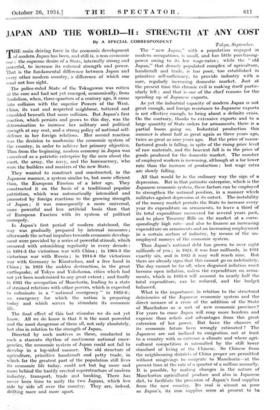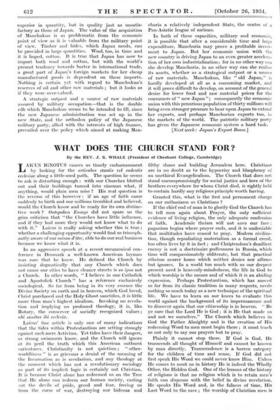JAVAN AND THE WORLD-H: STRENGTH AT ANY COST
By A SPECIAL CORRESPONDENT Tokyo, September.
9111E main driving force in the economic development 1 of modern Japan has been, and still is a non-economic one : the supreme desire of a State,' internally strong and powerful, to increase its external strength and power. That is the fundamental difference between Japan and every other modern country, a difference of. which one must not lose sight.
The police-ruled State of the Tokugawas was rotten at the core and had not yet emerged, economically, from feudalism, when, three-quarters of a century ago, it came into collision with the superior Powers of the West. China, its vast and respected neighbour, tottered and crumbled beneath that same collision. But Japan's first reaction, which persists and grows to this day, was the determination to increase her military and political. strength at any cost, and a strong policy of national self- defence in her foreign relations. Her second reaction was the decision to modernize the economic system of the country, in order to achieve her primary objective. Thus from the beginning, modern economy. in Japan was conceived as a patriotic enterprise by the men about the court, the army, the navy, and the bureaucracy, who were the builders and masters of the new State.
They wanted to construct and constructed, in the Japanese manner; a system similar to, but more efficient than, the European Fascism of a later age. They constructed it on the basis of a traditional popular patriotism, which was automatically " intensified and promoted by foreign reactions to the growing strength of Japan ; it was consequently a more universal, more poWerful and less artificial basiS than that of European Fascism with its system of pOlitical monopoly.
In Japan's first period of modern statehood, the way was gradually prepared 'by internal *measures ; afterwards the actual impulses towards economic develop. ment were provided by a 'series of powerful stimuli, which occurred with astonishing regularity in every decade : in 1894-5 the victorious war with China ; in 1904-5 the victorious war with Russia ; in 1914-8 the victorious war with Germany in' Kiautschao, and a free hand in China ; 1923' the sudden 'destruction; in the great earthquake,' of Tokyo and Yokohama, Cities which had not yet been' modernized to any great extent -; and finally in 1931 the occupation of Manchuria, leading to a state of strained relations with other powers, which is expected to culminate in a " national emergency " in 1935-6 ; an emergency for which the nation is preparing today and which serves to stimulate its economic life.
The final effect of this last stimulus we do not yet know. All we do know is that it is the most powerful and the most dangerous of them all, not only absolutely, but also in relation to the strength of Japan.
Directed by such motives as these, conducted in such a staccato rhythm of continuous national emer- gencies, gencies, the economic system of Japan could not fail to develop in. a lop-sided manlier. The old structure of agriculture, primitive handicraft and petty trade, . in which far the greatest part of the population still lives its economic life today, could not but lag more and more behind the hastily erected superstructure of modern industry, transport, trade and banking._ There has never teen time to unify the two Japans, which live side by side all over the country. They are, indeed, „ . drifting more and more apart. The " new Japan," with a population engaged in modern occupations, is small, and has little purchasing- power owing to its low wage-rates ; while the " old Japan," that densely populated complex of agriculture, handicraft and trade, is too poor, too established in primitive self-sufficiency, to provide industry with a sure, regularly increasing domestic market. Just at the present time this chronic evil is making itself partic- ularly felt ; and that is one of the chief reasons for the speeding up of Japanese exports.
As yet the industrial capacity of modern Japan is not great enough, and foreign resistance to Japanese exports is not effective enough, to bring about a definite crisis.
On the contrary, thanks to extensive exports and to a large quantity of State orders for armaments, there is a partial boom going on. Industrial production -this summer is about half as great again as three years ago, twice as great as nine years ago. But the price of manu- factured goods is falling, in spite of the rising price level of raw materials, and the heaviest fall is in the price of goods, produced for the domestic market. The number of employed workers is increasing, although at a far lower rate than the increase of production ; but wage rates are slowly falling.
. All that would be in the ordinary way the sign of a depression. But in that patriotic enterprise, which is the Japanese economic system, these factors can be employed to strengthen the national position, in a manner which militates against depression at its outset. The instability of the money market permits the State to increase every year its expenditcire on armaments, to leave a third of its total expenditure uncovered for several years past, and to place Treasury Bills on the market at a corre- spondingly high rate—and also to finance an increasing expenditure on armaments and an increasing employment in a certain section of industry, by means 'of the un- employed moneys of the economic system.
Thus Japan's national debt has grown to over eight milliards of yen ; in 1924, it was four. milliards, in 1931 exactly six, and in 1935 it may well reach nine. But there are already signs that this cannot go on indefinitely. The day cannot be far off, when disguised inflation must become open inflation, unless the expenditure on arma- ments, which in 1935-6 will amount to nearly half the total expenditure, can be reduced, and the budget balanced.
What is the importance, in relation to the structural deficiencies of the Japanese economic system and the direct menace of a crisis of the addition of the State of Manchukuo as a sort of new economic province ? For years to come Japan will, reap more burdens and expense than reliefs and advantages from this great extension of her power. But have the chances of its economic . future been wrongly estimated ? The Japanese are not inclined to emigration. not at least to a country with so extreme a climate and where agri- cultural competition is intensified by . the still lower standard of living of the Chinese. So Chinese from the neighbouring districts of China proper are permitted without misgivings to emigrate to Manchuria—at the present time at the rate of a quarter of a million annually.
It is possible, by making changes in the nature of Manchurian agricultural produce and. also in Japanese diet, to facilitate the provision of Japan's food supplies from the n- ew country. Its coal is almost as poor as Japan's, its iron supplies seem at present to be superior in quantity, but in quality just as unsatis- factory as those of Japan. The value of the acquisition of Manchukuo is as problematic from the economic point of view as it is valuable from the military point of view. Timber and hides, which Japan needs, can be provided in large quantities. Wool, too, in time and it is hoped, cotton. It is true that Japan has now to import both wool and cotton, but with the world's present tendency towards barter in international trade, a great part of Japan's foreign markets for her cheap manufactured goods is dependent on these imports. Nothing is certain yet with regard to Manchukuo's reserves of oil and-other raw materials ; but it looks as if they were over-valued.
A strategic outpost and a source of raw materials assured by military occupation=that is the double role which Manchukuo seems to be intended to fill, since the new Japanese administration was set up in the new State, and the orthodox policy of the Japanese military party, allied with the interests of high finance, prevailed over the policy which aimed at making Man- churia a relatively independent State, the centre of a Pan-Asiatic league of nations.
In both of these capacities, military and economic, it is possible that after a considerable time and large expenditure, Manchuria may prove a profitable invest- ment to Japan. But her economic union with the new country is driving Japan to an even greater accelera- tion of her own industrialization; for in no other way can she develop Manchuria, in no other way can she realize its assets, whether as a strategical outpost or a source of raw materials. Manchukuo, like " old Japan," is hardly developed at all as a consuming market, and it will prove difficult to develop, on account of the general desire for lower food and raw material prices for the consumers of " new Japan " ; consequently the economic union with this penurious population of thirty millions will bring even stronger pressure to bear upon Japan to extend her exports, and perhaps Manchurian exports too, in the markets of the world. The patriotic military party has given the Japanese economic system a hard task.
[Next week: Japan's Export Boom.]























































 Previous page
Previous page